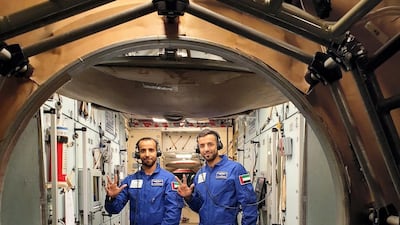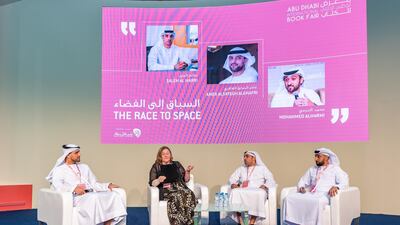Three of the most prominent figures in the UAE's space programme appeared at the Abu Dhabi International Book Fair on Saturday, where they spoke about the Emirati astronauts preparing to go into space, KhalifaSat, the first satellite fully manufactured in the UAE, and the programme's long-term plans.
“What we will achieve in the future will truly be remembered for years and years to come,” said Amer Mohammad Al Sayegh, Director of the Space Systems Development Department at Mohammed bin Rashid Space Centre (MBRSC). “We are a small country in this world. If we want to be a country that is prominent, we have to make big achievements.”
One such achievement will be sending the first Emirati astronaut into space and Hazza Al Mansouri is due to leave Earth on September 25, with Sultan Al Neyadi as back up. It has already been a long journey for both men, however, who saw off competition from thousands of other applicants, including nearly 2,000 women.
Salem Al Marri, Assistant Director General for Scientific and Technical Affairs at MBRSC, revealed that 40 per cent of the 4,000 applicants were Emirati women. “That is something we were definitely not expecting,” he said. “When this programme kicked off, we expected 400-500 candidates and maybe 10 per cent to be women. It was an overwhelming amount for us but that shows the interest in space today. Our leadership’s objectives are being met. We can see the results are starting to show.”

Al Marri also opened up about his time in South Korea, where he and the other men on stage were based for a number of years from 2006, in order to learn the necessary skills for their roles at MBRSC. “The objective from day one was that we should move from a country dependent on buying technologies to a country that can build and manufacture our own technologies,” he said.
“When we went to South Korea, we had a national mission to work very hard, build up a strong team and learn as much as we can […] so that eventually, 15 years later, we’d be able to develop our own space technology and satellites.”
That is exactly what has happened, of course. The KhalifaSat launched in 2018, providing vital, hi-res satellite imagery of Earth to help rescue teams in the aftermath of natural disasters. There is the Emirates Mars Mission, too. An Emirati satellite is due to launch next year and start monitoring the atmosphere of the Red Planet from 2021.
“It will be the first one to study the Martian atmosphere on a daily basis,” said Mohammad Al Harmi, Director of Space Operations at MBRSC. “Other satellites have done that but not a daily basis. Our plan is not just about Mars, it’s also about making sure our Emirati students and engineers are involved in the big space projects.”
Al Sayegh added: “When you are in the space community, you realise that space is beyond boundaries, beyond nations. In conferences you find people from Africa, Asia, the US, and Europe. And what makes space even more appealing is that it’s always challenging. When you work in space you become a person who challenges themselves.”
If such a life appeals, be warned, though: it requires hard work. “In this day and age, a lot of people look for quick wins and that’s what we want to move away from,” said Al Marri. “You need to make sacrifices, you need to look at the long-term vision […] When the team was sent to South Korea it was not for a year, a year and a half, some of us spent nearly ten years there. Commitment and hard work is what gets you there.”
The Abu Dhabi International Book Fair is on until April 30. For more information, visit www.adbookfair.com


